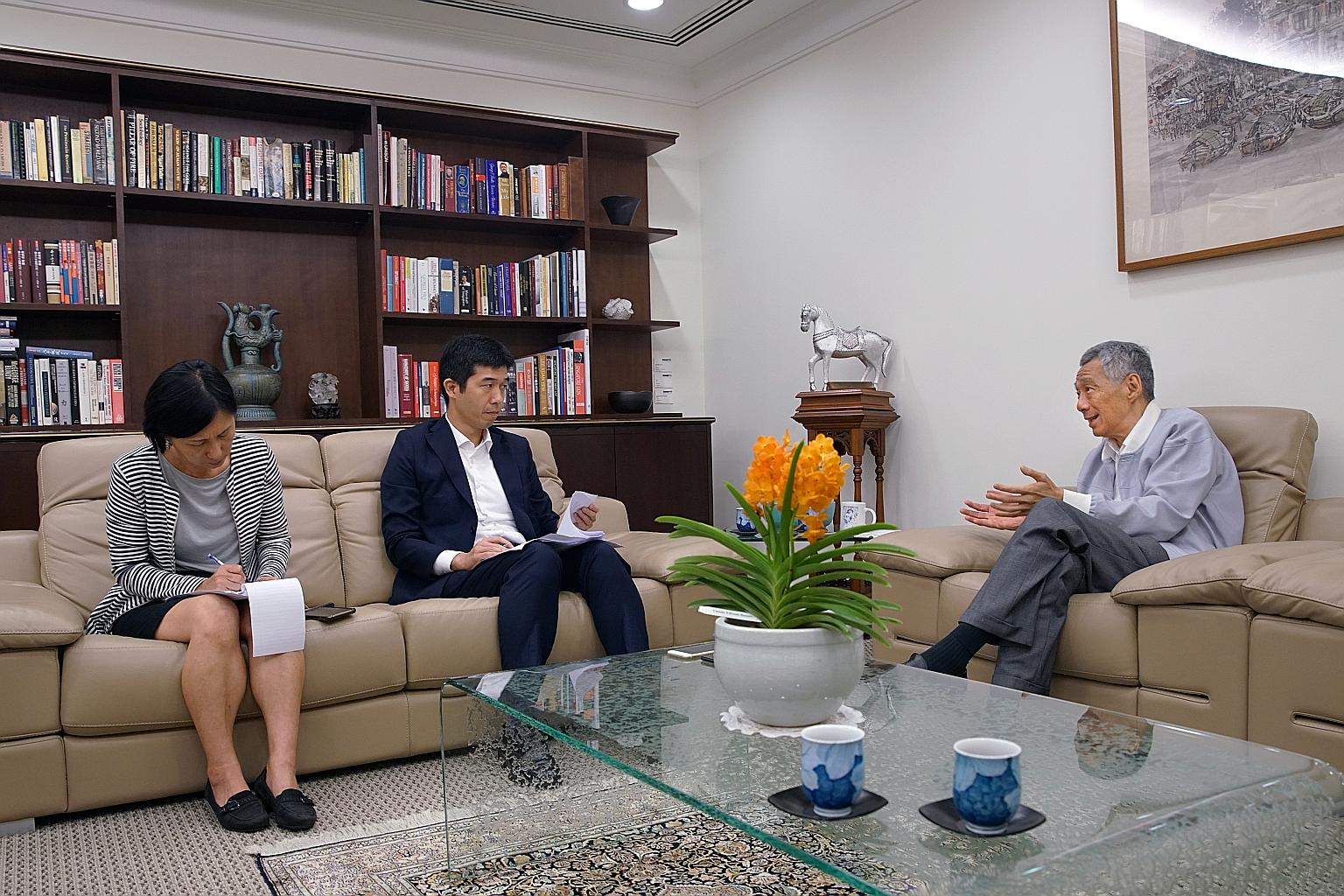Singapore can work with Japan on ageing issues, smart cities: PM Lee Hsien Loong
Sign up now: Get ST's newsletters delivered to your inbox

Prime Minister Lee Hsien Loong speaking with Mr Takashi Nakano, Singapore bureau chief of the Nikkei Asian Review. PM Lee said Japan has a very large elderly population, and Singapore will reach that point in a decade.
PHOTO: MCI
Tackling the challenges of an ageing population and developing smart cities are two areas in which Singapore can work with Japan, Prime Minister Lee Hsien Loong said yesterday.
Both nations can also team up on infrastructure projects in other countries, and together champion the open, inclusive, rules-based multilateral trading system, he added.
Speaking to the Nikkei Asian Review ahead of his visit to Japan for the Group of 20 Summit in Osaka this week, PM Lee pointed out that Japan has a very large elderly population, and Singapore will reach that point in a decade.
"In 10 to 11 years' time, we will be like Japan today," he said. "And that is a big adjustment for us, so we need to learn from Japan."
Singapore is not a G-20 member but has been invited to take part in this year's summit as a guest of this year's chair, Japan.
PM Lee added that Japanese technology in universities and multinational firms is very advanced. "We hope to do research and development with you, and we hope that it will be the basis for Japanese investments in Singapore."
On top of that, firms on both sides have worked on each other's infrastructure projects, and are therefore familiar with each other.
-
On HK situation and PM handover
During his interview with the Nikkei Asian Review, Prime Minister Lee Hsien Loong took questions on a variety of topics, including the current situation in Hong Kong and his succession plans.
Q Now, the situation in Hong Kong is very serious. Will the current situation be a threat to Hong Kong's position as an international business hub?
A We hope they overcome the difficulties, and we wish Hong Kong well. We do a lot of business with Hong Kong. We do not see them as a threat to us at all, and I do not think they see us as a threat to them. We hope that they will overcome these problems.
Q You just promoted Mr Heng Swee Keat to Deputy Prime Minister in May. So, when do you plan to pass the baton to your successor?
A After the next general election. So some time in the next term, not too long after the next general election.
Q But definitely after the next general election?
A Yes, definitely after the next general election.
Q Will you likely remain in Cabinet after you have passed the baton to DPM Heng Swee Keat?
A That is up to my successor.
Highlighting construction giants such as Obayashi and Kajima, PM Lee said: "You have huge engineering companies. They have done the MRT projects, they have done airport projects, they have built our infrastructure. We have great confidence in them because their standards are high and they are reliable partners."
When asked if Singapore still has anything to learn from Japan, given that China is now much bigger, PM Lee replied that China's scale may be bigger because its population is larger, but Japan still has valuable experience.
"I think in terms of technology, in terms of expertise operating internationally doing major projects and carrying them to successful completion, Japan still has very valuable experience and is ahead," PM Lee said.
"Within China, they have done very impressive major infrastructure projects. Overseas, it is a more difficult exercise because it is not just engineering and a construction job, but also managing the different cultural environments and different national needs."
He added that this is something the Chinese are trying to do through their Belt and Road Initiative. "I do not see any reason why they should not be able to master this, but Japan has a lot of experience," PM Lee said.
He was also asked if he plans to grow the Digital Economy Partnership Agreement as another big trade pact in the Asia-Pacific region. Talks on the agreement, which aims to advance better trade in the digital era, had started last month with two other countries - Chile and New Zealand.
"For a start, I think, let us get the shape of the possible agreement, settle in as favourable circumstances as possible. Because when you have many more members, it becomes more complicated, he replied. "Let us get the first step taken and make sure it is properly born first. After that, we can have big dreams."


